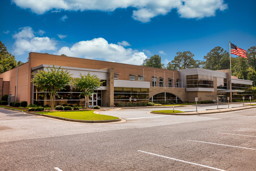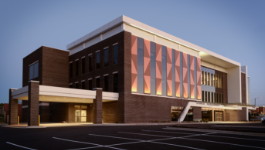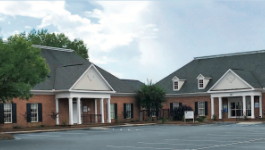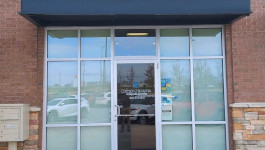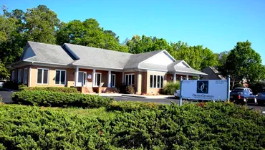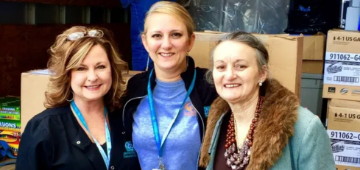Avoiding Holiday Season Slips, Trips, and Falls
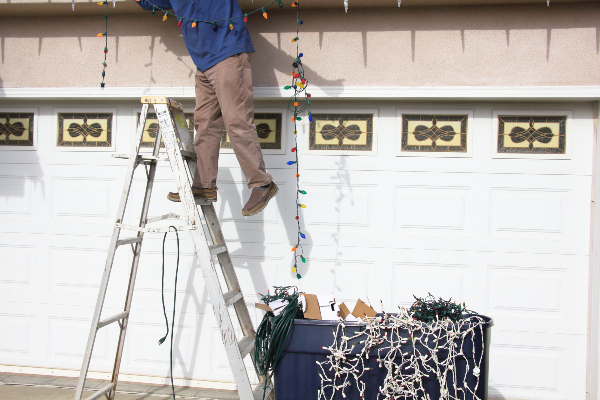
The holidays are supposed to be a festive time to gather with friends and family. They should be joyous, restful, and enjoyable – and not marred by an injury resulting from a slip, trip, or fall. Unfortunately, along with the holiday festivities come several things that can make a slip, trip, or fall even more likely than at other times of the year.
In this article, we’ll look at how to avoid common trip hazards, slip dangers, and other things that can lead to a fall and a nasty break, sprain, or other orthopaedic injury. We’ll also discuss what to do if your preventative measures aren’t enough and you suffer a fall during the holidays.
Trip Hazards
As much as we want to rest and relax during the holidays, they can get a little hectic. Between family visits, shopping, presents, decorating, and the many other traditions of the season, there are plenty of opportunities to injure yourself by tripping. Here are some common holiday trip hazards and how to avoid them.
Cords and Cables
This one may be the most common holiday trip hazard. Lights on the tree, new toys and electronics, yard decorations, and more all rely on cords and cables to carry power or data. Since these cords are usually temporary, they’re dangerous in a couple of different ways:
- We’re not used to having a cord in that location, so there’s a strong tendency to forget that there’s a wire running where there usually isn’t one.
- We often don’t secure these cords adequately, causing them to curl up off of the floor or ground and pose an even more significant trip hazard.
You can take a couple of steps to reduce the chance that someone will trip over a cord this holiday season:
- Tape down cords along their entire length, or use a cord saver to secure the cord to the floor.
- Take the extra time to route cords in out-of-the-way and low-traffic areas.
- If a cord has to be run in a high-traffic area, make sure it remains visible. Use bright-colored cords or bright tape to secure the cord to make certain people can see the trip hazard.
Clutter
With guests in the house, new gadgets and toys to play with, and (hopefully) a little more relaxed atmosphere around the home, clutter accumulates underfoot during the holidays. Even a single building block, if left in the middle of a walkway or top of a staircase, can be a dangerous trip hazard.
During the holidays, even if your regular cleaning schedules are relaxed, take some time each day to ensure that high-traffic areas are cleared of clutter and that people don’t have to step over stuff to get from point A to point B.
If you do have to cross a cluttered area, take your time. Be careful about where you step, and make sure you have a solid footing before you take your next step. Move slowly, and don’t let your body get out ahead of your feet.
Store Displays
The stores are full of holiday shoppers – and holiday trip hazards. Even your neighborhood grocery store is likely more well-stocked than usual, and product displays, shipping cartons, and even loose products are more likely to be found where you’d typically be walking. Of particular danger are shipping palettes of the types used in large discount stores, which usually aren’t brightly colored and are exactly the correct height for someone to trip over.
When you’re doing your holiday shopping, take care where you walk, take your time, and – above all – don’t walk with your head down in your phone or shopping list. If you have to send a text or consult your list, move out of the way and stop long enough to do what you need to do before you resume your shopping.
Slip Hazards
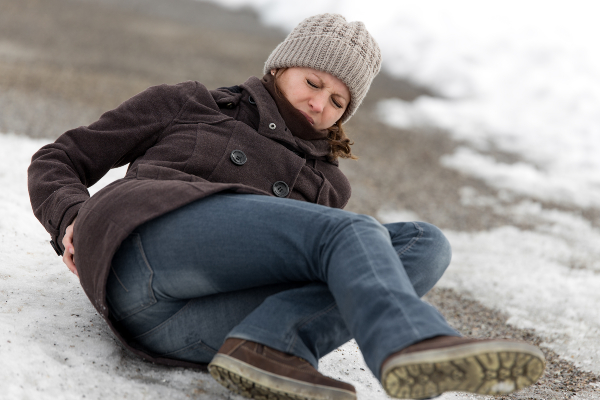
Trips are one common injury threat; slips are another way people end up in the urgent care center over the holidays.
Ice
While ice on roads, sidewalks, and walkways may not be a common occurrence in Middle Georgia, it’s certainly not unheard of. And if you’re visiting family where the climate is a little more wintry, you should expect to encounter some ice.
Whenever possible, stay away from ice or use salt, sand, cinders, or another melting or traction agent to help stay upright. If you simply can’t avoid walking across the ice, move slowly, be sure of your footing when you move, and stop walking if you start to feel unsteady.
Kitchen Slips
We all love good holiday cooking, but the kitchen can also be full of hazards. Water and beverages, ice, oil or grease, and many other things can become a dangerous slip hazard if spilled. Whenever something gets spilled in the kitchen (or bathroom, or living room, or any other place in the house with hard floors), stop and clean it up immediately.
Fall Hazards
Even without slipping or tripping, there are plenty of other ways to suffer a fall over the holidays.
Ladders
Probably the most common cause of holiday injuries, falls from a ladder are regrettably a part of too many peoples’ holidays. Whether you’re running lights along the eaves, hiding presents in the attic, or just putting the topper on the tree, remember these important ladder safety tips:
- Never overreach on a ladder. Most people who fall off a ladder do so when they reach too far to one side and their center of gravity extends beyond the ladder’s legs. If you must reach something far to one side, climb down and reposition the ladder.
- If you’re using an extension or straight ladder, ensure that the base is well-secured and that the top of the ladder is leaning on something solid.
- If you’re using a step or platform ladder, make sure the legs are fully open and that the support brace is fully extended and locked.
- Make sure someone is there to help by holding the ladder while you’re on it.
Misuse of Gifts
While your daughter’s new skateboard may bring back memories of your days performing kickflips and grinding rails in your youth, Christmas morning isn’t the time to reclaim your former glory. While we tend to be pretty conscious of ensuring that our kids wear the proper safety gear when they try out their new toys, we often fail to be quite so mindful of our own safety.
Bikes, skates, rollerblades, scooters, and other wheeled presents must be operated safely by everyone, and if you don’t have a proper helmet, pads, gloves, and other safety gear, it’s best to stay off of them until you do.
If You Slip, Trip, or Fall
If you do suffer from a holiday slip, trip, or fall, your next steps can make the difference between a speedy recovery and a holiday spent in pain.
Assess Your Injuries
After your fall, stay put for a moment and determine whether you’ve been injured. Take the time to assess every part of your body. The onset of pain after a fall can take anywhere from a few seconds to a few days, but most significant injuries will be reasonably apparent pretty quickly. If you don’t feel any severe injuries, you can start to get up.
Get Up
Get up slowly and carefully, paying attention to your body as you do so. If any motion you make causes pain, stop and reevaluate. If possible, go from the floor or ground into a chair or bench and stay seated while you check yourself for injuries again.
If You Are Mildly Injured
The most common injuries during falls are scrapes and bruises, sprains and strains, and fractures. Scrapes and bruises are usually minor and can be addressed with over-the-counter options.
If you experience mild pain in a limb, but there’s no severe pain or swelling, you can probably address the pain with over-the-counter pain relievers and use the RICE protocol to reduce inflammation:
- Rest: Don’t exert the injured limb; rest and let the injury heal
- Ice: Apply ice to the injured area in 20-minute increments
- Compression: Use an ACE bandage or other wrap to keep pressure on the injured area and prevent the building up of fluid in the inflamed tissues
- Elevation: Keep the injured limb elevated above the level of the heart.
If You Have More Serious Injuries
If you have severe pain or swelling, have lost any range of motion, or have any other symptoms that aren’t controllable with over-the-counter pain relievers and RICE therapy, visit the OrthoGeorgia Urgent Care Center, our dedicated orthopaedic walk-in clinic.
When you arrive at a traditional hospital waiting room with a musculoskeletal injury, you will often be triaged behind other patients who are presenting with more serious conditions. This means you’ll be waiting, sometimes for hours, in a waiting room, along with patients there for any reason, including infectious diseases.
At an OrthoGeorgia orthopaedic walk-in clinic, we only see patients with orthopaedic injuries, so there’s no chance of your sprain, strain, or fracture taking a backseat to someone else’s life-threatening emergency. You’ll find shorter wait times, immediate care by an orthopaedic specialist, and a significantly reduced chance of bringing home a hospital-related infection.
If you’re wondering whether OrthoGeorgia Urgent Care is the right solution for what you’re experiencing after your fall, here’s a handy table to help you identify whether you need to visit Urgent Care, go to an emergency room, or make an appointment with an OrthoGeorgia specialist:
| Injury/Condition | OrthoGeorgia Urgent Care | Emergency Room | Appointment |
| A bone, joint, or muscle injury that occurred in the last few days | X | ||
| Possible sprained ankle or foot | X | ||
| Sprained knee | X | ||
| Injury to hand, wrist, or shoulder | X | ||
| Swollen joint | X | ||
| Sports injury | X | ||
| Recent back pain (2 weeks or less) | X | ||
| Cuts or wounds | X | ||
| Shoulder dislocation | X | ||
| Head injury | X | ||
| Motor vehicle accident | X | ||
| Chronic back and/or neck pain | X | ||
| Any joint pain that has been present for an extended time and/or had previous treatment | X |
We offer Urgent Care services in Macon and Warner Robins:
Macon Urgent Care
3708 Northside Drive, Macon, GA
7:30 am to 7 pm Mon – Fri
9 am to 1 pm Sat
478-750-2803
Warner Robins Urgent Care
301 Margie Dr, Warner Robins, GA
7:30 am to 7 pm Mon – Fri
9 am to 1 pm Sat
478-333-5960
Had a Slip, Trip, or Fall Getting Ready for the Holidays? Call Us at (478) 745-4206 Today!
Disclaimer: The information contained within this material is intended for informational purposes only. No material in this content is intended to be a substitute for professional medical diagnosis, treatment, or advice. Always seek the advice of your physician or other healthcare provider with questions regarding your medical conditions and treatment options.
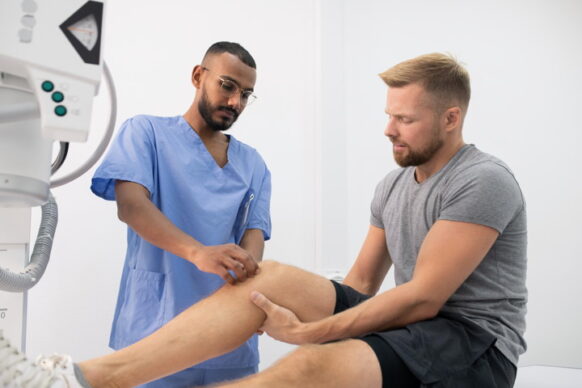
Personalized Orthopaedic Care in Central Georgia
At OrthoGeorgia, we want to help you live a healthier and more comfortable life by giving those in Macon, Warner Robins, Kathleen, Milledgeville, Dublin, Hawkinsville, and the surrounding areas convenient access to the highest quality care. Whether you have been suffering from a sports injury or a common orthopaedic condition, we will determine the cause of your discomfort and craft a personalized treatment plan to bring you relief. To learn more about our services and our physicians, or to schedule an appointment at OrthoGeorgia, please contact us today.
